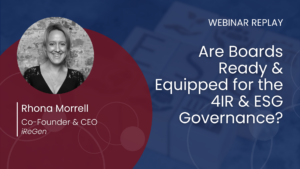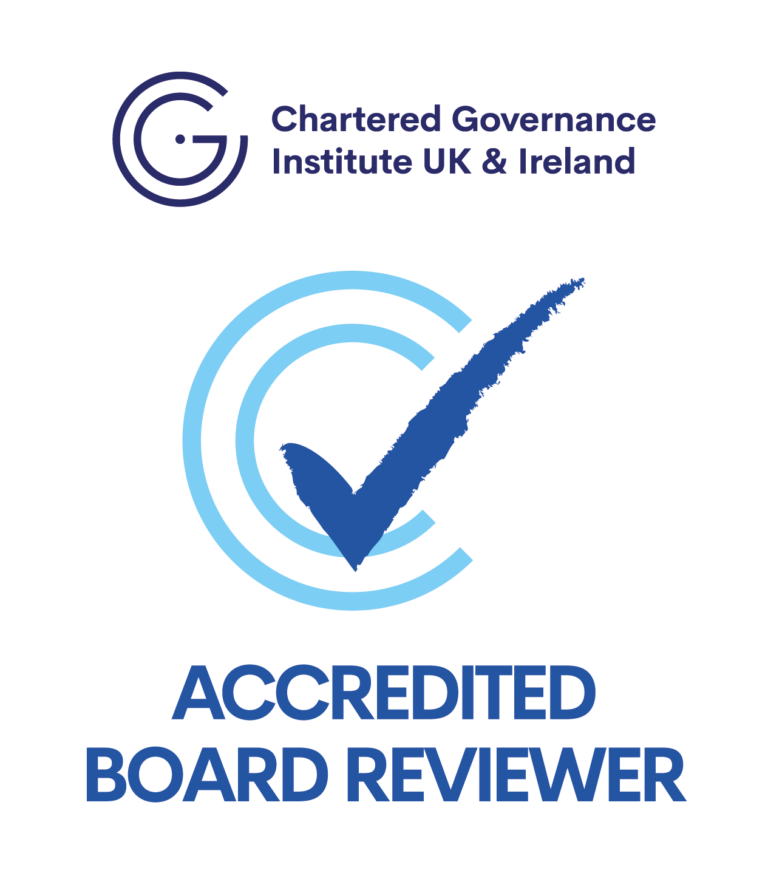In today’s rapidly evolving business landscape, the convergence of digital, physical, and biological technologies of the Fourth Industrial Revolution presents both unprecedented challenges and significant opportunities.
Read on to explore how organisations can thrive by embracing the Fourth Industrial Revolution (4IR) and prioritising Environmental, Social, and Governance (ESG) practices to drive sustainable growth and long-term value.
Thriving in an Ever-Changing Business Landscape
In an ever-changing business landscape, how can organisations and their boards thrive?
The Fourth Industrial Revolution is a significant business marketplace shift that is characterised by the convergence of digital, physical, and biological technologies. It has a profound impact on how companies operate, compete, and create value.
While many boards are beginning to understand the inevitability, risks and opportunities of the 4IR. Sustainability leads recognise the prioritising of ESG practices but evidence shows that there is still a lack of knowledge and understanding of the potential impacts of the Fourth Industrial Revolution .
We recognise that often, the resistance to change, a strong human trait, is compounded due to the complexity of the new technologies which they will need to embrace and invest in.
However, being open minded and receptive of the rapid pace of technological change and prioritising ESG practices, can create significant opportunities for companies. For example, investing in emerging technologies and upskilling the workforce can increase productivity, drive innovation, and create new products and services that meet changing market demands.
Prioritising ESG can also lead to greater stakeholder trust, improved brand reputation, and increased access to sustainable investment. It helps to avoid risks such as reputational damage, legal and regulatory penalties, and loss of investor confidence.
Our CEO, Sharon Constançon and Rhona Morrell, co-founder, and CEO of iReGen, discuss the readiness of organisations and their boards for the Fourth Industrial Revolution and the true embracing of ESG.
Listen to the webinar, as they explore and share their key insights during their enlightening conversation on the challenges and opportunities that companies and their Boards face today.
Rhona Morrell, Founder, and CEO of iReGen, highlights that companies who ignore ESG risks may miss opportunities to innovate and create value. By embracing the potential of the Fourth Industrial Revolution and prioritising ESG, organisations and their boards can create long-term value, adapt to changing market demands, and drive sustainable growth. Instead of fearing the risks, companies can seize the opportunities and make a positive impact for their stakeholders and the world.
Future Legislative Framework Around the Fourth Industrial Revolution
How do organisations navigate the evolving legislative framework around the Fourth Industrial Revolution and ESG?
The legislative framework around the 4th Industrial Revolution and ESG is a dynamic area that is constantly evolving to address new challenges. This presents exciting opportunities for organisations that are willing to embrace change and stay ahead of the curve.
While there may not be specific laws governing emerging technologies associated with the Fourth Industrial Revolution in some countries, there is growing recognition of the need to regulate these technologies in a safe, ethical, and responsible manner. This can help organisations to develop new products and services that align with evolving regulatory requirements.
Similarly, ESG regulation is evolving, with governments and regulators around the world introducing new laws and guidelines that set standards for sustainable business practices. This is great news for businesses that prioritise ESG, as it helps to level the playing field and ensure that all companies are held to the same high standards. By complying with these regulations, companies can build trust with stakeholders and enhance their brand reputation.
Boards have a critical role to play in ensuring compliance with these evolving legislative frameworks. By staying up to date with the latest laws and regulations and prioritising sustainability and responsible business practices, boards can help their organisations to stay ahead of the curve.
By establishing a robust risk management and reporting framework that identifies and allows for the management of the risks associated with the Fourth Industrial Revolution and ESG, helping organisations to adapt to the evolving legislative landscape and drive sustainable growth.
Ultimately, embracing the opportunities presented by the Fourth Industrial Revolution and ESG can help organisations to create long-term value, build trust with stakeholders, and make a positive impact on the world.
“The future is not about fighting change, it is about harnessing it and creating sustainable solutions.”Rhona Morrell
Creating Long-Term Value by Embracing the Fourth Industrial Revolution & ESG
Morrell’s work with iReGen Marketplace and Reclaim Earth CIC highlights the importance of putting brands at the heart of impact and creating effective ROI through ESG and change management.
Boards need to stay up to date with the evolving legislative framework around the Fourth Industrial Revolution and ESG to remain compliant.
By embracing the potential of the Fourth Industrial Revolution and prioritising ESG, organisations and their boards can create long-term value, adapt to changing market demands, and drive sustainable growth. Rather than fear or inaction, it would empower to rather face the risks as opportunities and be a leader in change.
To thrive in the rapidly changing landscape of the Fourth Industrial Revolution and ESG, the executives and the boards must have an entrepreneurial and innovative mindset. The culture set by the Chairman and the CEO must be one that embraces change, drives investment in innovative technologies, and focuses on upskilling their workforce.
As Morrell aptly notes, “the future is not about fighting change, it is about harnessing it and creating sustainable solutions.”
Challenges and Opportunities for Modern Businesses
In the dynamic landscape of the Fourth Industrial Revolution, businesses face a unique set of challenges and opportunities. Addressing these effectively can position companies for long-term success.
Opportunities:
- Investing in emerging technologies and upskilling the workforce can boost productivity, drive innovation, and lead to the development of new products and services that align with evolving market demands.
- Prioritising Environmental, Social, and Governance (ESG) principles can enhance stakeholder trust, improve brand reputation, and increase access to sustainable investments.
- Boards play a crucial role in ensuring compliance and accountability within the shifting legislative frameworks.
- By establishing clear governance structures and robust risk management and reporting frameworks, companies can adapt and thrive in the Fourth Industrial Revolution era.
Challenges:
- The rapid pace of technological change in the Fourth Industrial Revolution can result in lost productivity, declining market share, and obsolescence.
- The impact of the Fourth Industrial Revolution on the workforce may cause significant social and economic disruption.
- ESG risks, including reputational damage, legal and regulatory penalties, and loss of investor confidence, pose significant threats.
- The evolving legislative framework around the Fourth Industrial Revolution and ESG presents compliance and accountability challenges for companies and their boards.
Change as a Catalyst for Growth and Innovation
Seeing change as a catalyst for growth and innovation rather than a threat is crucial. According to Rhona Morrell, embracing change and creating solutions is key to navigating the future
By promoting a culture that welcomes change, investing in technologies, and focusing on enhancing the skills of employees, businesses can thrive in today’s environment and emerge stronger. The path ahead is full of possibilities, and those willing to seize them will not only achieve success but also make an impact on the world.
The Fourth Industrial Revolution and ESG present not challenges but opportunities that should be embraced. If organisations lead with courage, pursue innovation with zeal, and commit to sustainability, ensures a resilient future for everyone.
Concluding Thoughts
As we find ourselves at the brink of an era of change, the road ahead for businesses appears both clear and daunting. The Fourth Industrial Revolution isn’t a passing trend; it represents a shift that requires adaptability, foresight, and a steadfast dedication to innovation. Enthusiastically embracing the advancements of the 4IR can open up avenues of productivity and creativity, ensuring companies stay at the forefront of their respective fields.
Equally important is giving priority to Social and Governance practices. ESG goes beyond being a term; it serves as a roadmap for constructing reputable and sustainable enterprises. Companies that integrate these principles into their operations won’t just mitigate risks but also cultivate enduring trust with stakeholders, attract sustainable investments, and elevate their brand reputation.
The changing legislative landscape concerning 4IR and ESG presents its set of obstacles. However, it also provides an excellent opportunity for those ready to anticipate regulatory shifts and commit to ethical business practices. Boards of directors have a role in this scenario by ensuring that their organisations aren’t merely compliant but trailblazers in establishing benchmarks.
Ultimately, success in this new era hinges on having a mindset and looking forward.
Ready to navigate the complexities of the the Fourth Industrial Revolution & ESG?
If you would like to:
- Find out more on how to energise creativity and empower your organisation’s leadership to think sustainably.
- Framework you decision-making capabilities around innovation and the modern agenda.
- Find out how to ensure your board is compliant with evolving legislative frameworks.
- Explore how we can help your organisation embrace change, prioritise ESG, and drive sustainable growth.
- If you have any questions that relate to specific challenges.























